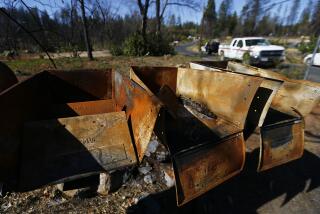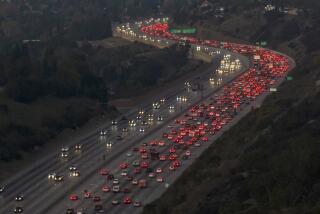Agency Favors Car Insurance Rates Change
The state Department of Insurance no longer believes that the territorial rating system used to price auto insurance in California is working satisfactorily and it is helping to draft proposed changes in the law that would provide alternatives, the department’s consumer affairs chief said Tuesday.
Everett Brookhart told a hearing of the Los Angeles County Board of Supervisors that under one of the alternatives, insurance rates would be based on a person’s driving record rather than the neighborhood in which he lived.
Another alternative under discussion with legislators would establish a “bare-bones, no-fault” liability policy to be offered to all the state’s motorists at a flat rate that would satisfy the most pressing insurance needs, he said.
Under the territorial rating system, a person living in an area where risks are high can pay two or three times the premium of a person with a similar driving record but who lives in an area of lower risk.
Brookhart’s criticism of the territorial system represented a departure from statements he and Insurance Commissioner Bruce Bunner made last November, when they declared the territorial rating method to be justified.
Department ‘Not Happy’
On Tuesday, Brookhart said the department is “not happy with the results” of the territorial system.
He said that while losses due to accidents--and resulting insurance company pay-outs on claims--are much higher in some neighborhoods than others, the discrepancy in prices between neighborhoods has reached such a point that insurance has become unaffordable to many persons, particularly in the economically deprived areas where the rates are often the highest.
Brookhart’s observations came one day after the Insurance Department released a comparative auto insurance rate survey for Los Angeles County that dramatically demonstrated the variance of annual rates even among adjacent neighborhoods. The survey showed hundreds of dollars of variation in premiums, sometimes by just crossing a city or ZIP code boundary.
He said a recent department survey showed that in South-Central Los Angeles, for instance, between 50% and 70% of all motorists were uninsured as compared to a statewide average of about 15%.
Brookhart said he and other Insurance Department officials had interviewed insurance agents in South-Central Los Angeles and had been told that the rates there would have to come down perhaps 50% before any substantial number of uninsured drivers will buy insurance.
Department Notes Need
He said it has become apparent to the department that some other system of pricing is needed to make the insurance system workable in such neighborhoods, he said.
Brookhart did not indicate when the proposals will be introduced. But either of the alternatives--record-based pricing or a bare-bones, no-fault liability policy at a flat rate to all drivers--would represent a revolution in the way auto insurance is sold in California.
One supervisor who was present Tuesday, Ed Edelman, remarked after hearing Brookhart:
“The present system has got to be changed. . . . The insurance companies better come up with something, or they will find themselves regulated far more. . . .”
A number of bills to abolish the territorial rating system of pricing premiums have already been introduced in Sacramento, the latest last week by state Sen. Art Torres (D-South Pasadena).
In the past, such bills have foundered in the Legislature’s insurance committees after industry lobbyists pointed out that lowering rates in high-priced areas would mean the rates for many in low-priced areas would have to rise, perhaps sharply.
Based on Driver Records
The Torres legislation would shift the basis of pricing to driver records, one of the alternatives mentioned by Brookhart.
But industry spokesmen have pointed out that California keeps records for only three years, and some of these records--particularly of accidents--are not regarded as all that accurate. At the very least, such a shift would necessitate longer retention of the records and a much more comprehensive effort to obtain accurate records.
In another matter, Brookhart said the Insurance Department will send its full Los Angeles County comparative rate survey to anyone who requests it and sends a self-addressed envelope to the department with stamps totaling 56 cents, the cost of the postage.
More to Read
Sign up for Essential California
The most important California stories and recommendations in your inbox every morning.
You may occasionally receive promotional content from the Los Angeles Times.










